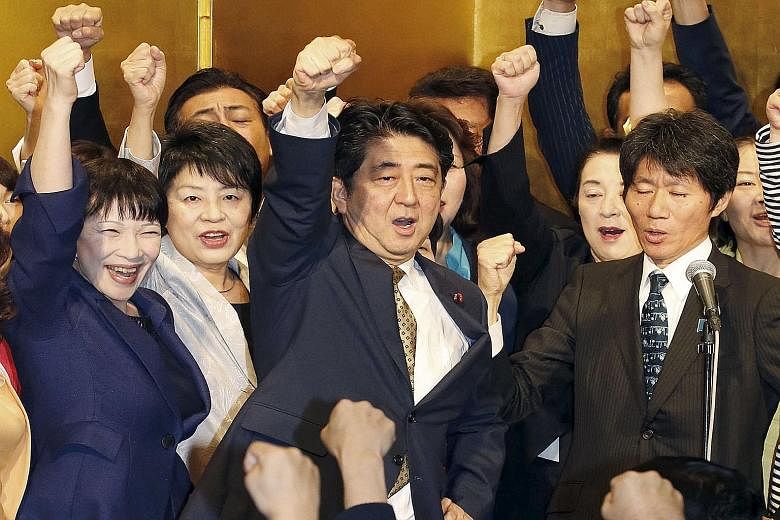TOKYO • Japanese Prime Minister Shinzo Abe has won a rare consecutive term as ruling party chief, pledging to retain focus on reviving the world's third-biggest economy and deepen debate on revising its pacifist Constitution.
He is on course to become Japan's longest-serving prime minister in more than four decades after standing unopposed in yesterday's Liberal Democratic Party (LDP) leadership election.
Mr Abe, who took office in December 2012 promising to reboot a stale economy and bolster Japan's defences, won another three-year term as LDP president after the sole potential rival, former LDP executive Seiko Noda, did not get enough sponsors to launch a challenge .
"While creating a virtuous economic cycle, I will spread the feeling of recovery to every nook and cranny of the regions and throughout the country, completely escape deflation and create growth in a strong, future-oriented economy," he told a crowd of supporters.
Mr Abe said he would also tackle the problems of Japan's low birth rate and ageing population.
The leadership vote came as protests flare over unpopular legislation to expand the role of the Japanese military. Mr Abe said he would deepen public debate on revising Japan's post-war, pacifist Constitution with an aim to changing the charter.
Surveys show many Japanese voters are wary of revising the Constitution's pacifist Article 9.
A challenge by Ms Noda could have snarled debate over the security Bills, which the government aims to enact as early as next week. Putting the defence Bills to bed after months of wrangling would allow Mr Abe to focus to the economic policies that helped secure his unexpected comeback in 2012.
Japan has had a series of revolving-door leaders, beginning with Mr Abe's own troubled first term in 2006-2007, which was cut short by parliamentary gridlock and illness, after maverick Mr Junichiro Koizumi's five-year term as premier from 2001 to 2006.
Mr Abe is not required to hold a general election for another three years. If he stays in office until 2018, he would become the third-longest serving prime minister since World War II. The longest-serving was his granduncle Eisaku Sato, who was in office for more than seven years until 1972.
The yen has eased more than 30 per cent against the US dollar and Tokyo share prices and corporate profits have more than doubled since he took over as head of the then-opposition LDP in September 2012 and led the party to victory, buoyed by hopes for his "Abenomics" recipe for economic revival.
However, corporate investment is sluggish and wage rises have failed to keep pace with higher prices, dampening consumption. GDP shrank an annualised 1.2 per cent in the April-June quarter because of an export slump and weak consumer spending. Slow progress towards his goals of escaping deflation and restoring confidence in Japan's economy may be further complicated by recent market turmoil in China.
Economists say Mr Abe should tackle tough structural reforms, such as freeing up the rigid labour market to boost productivity. They see him as relying on more politically palatable measures, such as an extra budget for the current fiscal year and easy monetary policy.
"Winning unopposed makes him look like the only game in town," said Mr Robert Dujarric, director of the Institute of Contemporary Asian Studies at Temple University's Japan campus. "It was important for Abe to win with the biggest margin possible - which he did - as Abenomics isn't working yet and the security legislation isn't popular."
REUTERS, BLOOMBERG

